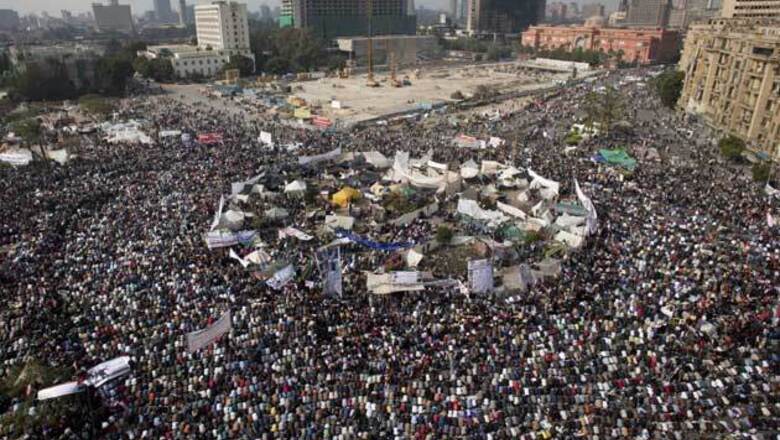
views
Cairo: Egypt's chief public prosecutor, forced to quit this week after opposition protests, retracted his resignation on Thursday, setting the stage for more turmoil as the nation votes in a referendum on its political future. Prosecutor Talaat Ibrahim, appointed by President Mohamed Mursi when he assumed sweeping new powers last month, said he had changed his mind because his resignation on Monday had been offered under duress.
Ibrahim had quit after more than 1,000 members of his staff gathered at his office in Cairo to demand that he step down. Mursi's decision to appoint Ibrahim, instead of leaving the appointment to judicial authorities, threatened the independence of the judiciary, the angered prosecutors said.
Ibrahim described his removal from office as "mysterious and abnormal" and said it was now up to the justice minister to decide on his future, according to the state-run al-Ahram news website. Several prosecutors immediately announced they were suspending work and would stage an open-ended protest outside Ibrahim's office.
Ibrahim's about-face came 48 hours before Egyptians vote in a referendum on a divisive new constitution championed by Mursi as a vital step in Egypt's transition to democracy almost two years after the fall of Hosni Mubarak. The opposition, facing defeat over the constitution, urged voters to reject the Islamist-backed charter and pledged to fight on to amend it during elections expected next year.
The opposition, a coalition of liberals, leftists, Christians and secular Muslims, called for a "no" vote against a document it views as leaning too far towards Islamism. The first day of voting on December 15 resulted in a 57 percent majority in favour of the constitution.
The second stage on Saturday is expected to produce another "yes" vote as it covers regions seen as more conservative and likely to back Mursi. The National Salvation Front, the main opposition coalition, said a "no" vote meant taking a stand against attempts by the Muslim Brotherhood, Mursi's political base, to dominate Egypt.
"For the sake of the future, the masses of our people should strongly and firmly say 'no' to injustice and 'no' to the Brotherhood's dominance," the Front said in a statement. A senior Front member, Abdel Ghaffar Shokr, head of the Popular Socialist Coalition Party, said that if the constitution was approved, the opposition would go on fighting to change it.
"That's why we will participate in the legislative election because it is the only way to amend the constitution," he said. The constitution must be in place before elections can be held. If it passes, the poll should be held within two months.
In an attempt to mobilise voters, the opposition said it planned to hold public meetings, distribute flyers and send cars equipped with loudspeakers through the streets. A street protest against the constitution in Cairo this week attracted only a few hundred people, well down on the numbers drawn to previous such events.
Islamist groups are planning a mass protest in Alexandria on Friday, a move likely to raise tensions a day before the vote. The Muslim Brotherhood called for the rally after a violent confrontation between Islamists and the opposition in Egypt's second city last week that ended with a Muslim preacher besieged inside his mosque for 14 hours.
The run-up to the referendum has been marked by often violent protests in which at least eight people have died. Mursi and his backers say the constitution is needed to advance Egypt's transition from decades of military-backed autocratic rule. Opponents say it is too Islamist and ignores the rights of women and of minorities, including 10 percent of Egyptians who are Christian.
Demonstrations erupted when Mursi awarded himself extraordinary powers on November 22 and then fast-tracked the constitution through a drafting assembly dominated by his Islamist allies and boycotted by many liberals. The referendum is being held over two days because many of the judges needed to oversee polling stayed away in protest.
Judicial authorities on Thursday named the judges who will supervise polling stations on Saturday. The opposition cited a lack of judges at some polling stations in a list of alleged irregularities in the first round. In order to pass, the constitution must be approved by more than 50 percent of those voting.

















Comments
0 comment